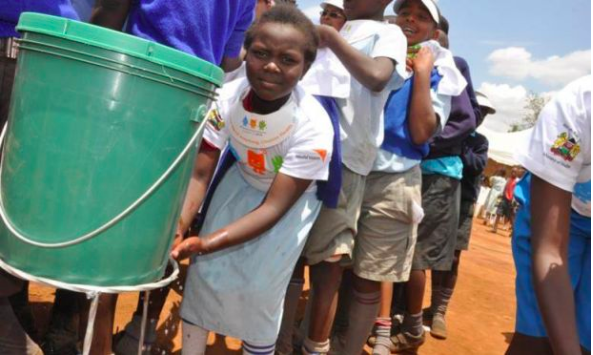October 13, 2017
By Wanjiku Kuria, Technical Specialist – Sanitation & Hygiene, World Vision Kenya; originally published 13 October 2017 by World Vision.

A girl washing hands during a past Global Handwashing Day celebration in Kenya.
Diarrhoea alone kills nearly 2 million people worldwide each year, of which 1.5 million are children. Nearly 90 per cent of diarrhoea is attributed to unsafe drinking water, inadequate sanitation, and poor hygiene. Poor water, sanitation and hygiene-related diseases are the number one cause of hospitalization and mortality for children under five. More than 50 per cent of all hospital visits in Kenya are for illnesses related to water, sanitation and hygiene. Although promotion of safe hygiene is the single most cost-effective means of preventing infectious disease, investment in hygiene is low both in the health and in the water and sanitation sectors.
This needs to change.
We need to intensify global advocacy efforts to increase budget allocation to this critical sector. Humanitarian organisations should be leading the way in this, though this is often not the case. Often, in an organisation’s budget for water, sanitation and hygiene (WASH) budget, hygiene receives the smallest funding allocation.
The simple act of handwashing with soap at critical times — such as after visiting the toilet, before eating, before preparing food and after changing a baby — goes a very long way in prevention of diseases such as diarrhoea. Hand hygiene proved to be the single most effective method against the spread of the Ebola Virus during the 2014-2016 outbreak. Handwashing with soap is one of the most critical hygiene behaviours in public health, and it has the potential to be one of the most cost-effective ways in which public health can be improved in developing countries. In a study carried out by Maxine Burton et al on, “The effect of handwashing with water or soap on bacterial contamination of hands,” it was found that after no handwashing, bacteria was found in 44 per cent of samples, handwashing with water alone reduced the presence of bacteria to 23 per cent, handwashing with plain water and soap reduced the presence of bacteria to 8 per cent.
Global Handwashing Day is a campaign to raise awareness of the importance of handwashing. It has been celebrated globally every October 15th since 2008, and Kenya is no exception. This years’ theme, Our Hands, Our Future, aptly captures the significance of handwashing to health. Prevention of mortality caused by preventable diseases such as diarrhoea by engaging in the simple life saving practice of handwashing with soap ensures that the world’s children have a future to speak of.
Children are one of the best agents of change, and World Vision (WV) Kenya works closely with them in its hygiene programmes to promote handwashing. Through health clubs in schools, children are taught the importance of handwashing with soap at critical times, and WV Kenya helps provide handwashing facilities to schools. Children are also taught how to make handwashing facilities using locally available materials, such as a ‘tippy tap’, which is made with a jerrican and string. Children then help pass on these knowledge and practices in their community at large, thus contributing to having healthier communities.
In Kenya, this year’s national Global Handwashing Day celebrations, organised by the Ministry of Health and partners (including World Vision), will take place at Isinya Primary School in Kajiado County. WV Kenya will be celebrating in other programme areas throughout the country.
Subscribe to our mailing list to receive regular updates from the Global Handwashing Partnership or follow us on social media.
© 2017 The Global Handwashing Partnership (GHP).